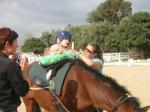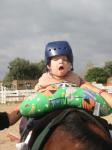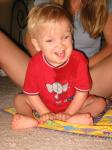In the first week of his hospital stay, Sam had every kind of test the doctors could think of. His irregular breathing was the most obvious and serious of his symptoms, so the doctors focused their attention on that. Sam was subjected to many kinds of blood tests to test for metabolic problems, heart echocardiograms and chest x-rays to determine if his heart and lungs were ok, and genetic tests to look for obvious genetic disorders. None of these tests came back abnormal, so that left one area left to explore -- Sam's central nervous system.
At this point the doctors spoke about Sam's irregular breathing as likely being "central," meaning they thought there might be something wrong with his central nervous system that wasn't letting him breath normally.
Sam had a CT scan of his brain, and the initial results showed that it was structurally abnormal in a couple of ways. The most obvious trait was a "cyst," or fluid-filled area, between the two lobes of his cerebellum. The CT scan was then followed by two MRIs and two EEGs over the next several days. The MRIs gave a clear picture (at least to the neurologists) of what was wrong with the structure of Sam's brain.
In a normal human brain, there is a membrane called the vermis that connects the two halves of the cerebellum. In Sam's brain, the vermis is poorly formed, leaving a fluid-filled area where there is normally brain tissue. Also, there is a "kink" in Sam's brain stem -- the part of the brain that controls some involuntary processes such as breathing.
The second MRI was sent to a developmental neurologist at CHOC who decided with little hesitation that Sam has a disease called Joubert Syndrome. This is the diagnosis that the doctors have settled on.
Joubert Syndrome is very rare -- statistics we've heard state that there may only be a few hundred known cases worldwide, and that there are perhaps about 10 cases reported per year in the U.S. (Those stats don't seem to agree with each other, but oh well....) Because of its rarity, there is relatively little known about it. It's not something most doctors, even Sam's neurologists, are familiar with. So unfortunately, we are left to gather information on our own as best we can by peppering doctors with questions and searching the web.
So, here is what we know so far:
- Joubert Syndrome is an inherited disease -- it's "autosomal recessive," meaning that Mindy and I were both carriers of the gene or genes that cause it, and Sam got a copy of the gene(s) from each of us. There was a 25% chance of this happening. Scientists have not yet been able to identify the gene(s) that cause Joubert Syndrome, so there wouldn't have been any way to screen for it.
- Sam's diagnosis is based on these symptoms: a particular structure called the "molar tooth sign" that appears on his MRI, an underdeveloped cerebellar vermis, a malformed brainstem, and irregular breathing. The molar tooth sign is a structure in Sam's brain that looks like a molar tooth on the MRI. Sam has "hypernea" when he's awake (he pants rapidly), and has episodes of apnea (he stops breathing) when he's asleep. There are other physical problems that may occur in people with Joubert Syndrome including kidney and eye problems, but so far we're not aware of any that Sam has.
- The molar tooth sign can appear in patients that suffer from other diseases that similarly affect the cerebellar vermis and the brain stem. This means that it will be necessary to make doubly sure that the diagnosis is correct.
- From the literature we've been able to read, there is a pretty wide range in the degree of severity of Joubert Syndrome. Some of the information we've read is pretty scary, describing severe physical deformities and mental retardation. Other articles mention children with slight physical problems and normal cognitive development. Researchers admit that there is not a well-known set of secondary symptoms that are always associated with Joubert Syndrome. There is talk in the medical community for the need to create a finer-grained classification system within the Joubert Syndrome diagnosis (e.g. Type A, Type B, etc.). This means that there's no sure way to know how Joubert Syndrome will affect Sam. It's very likely that he'll have some problems with either physical or cognitive development or both, but to what degree no one can know yet.
So, that's the story for now. Sam is obviously being tracked by many doctors in many disciplines, so we'll let you all know if anything new comes to light. We'll post again sometime soon to talk a bit about what Sam's diagnosis means for our family.



